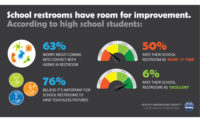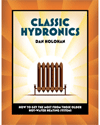High schoolers hand out bathroom grades to schools

It’s back to school time and this year a survey got the deets about teens’ handwashing habits, restroom evaluations and whether or not they stay home from school when they’re sick. The Healthy Handwashing Survey, conducted by Bradley Co. connected with 1,012 high schoolers ages 14 to 18 to gather their insights and opinions.
Handwashing and health
First, the survey found teens are educated about the benefits of handwashing since 97% believe sudsing up with soap and water is an important action for maintaining their overall health. Despite that, nearly two-thirds admit on occasion they’ve cheated by skipping the soap and simply rinsing with water. In addition, one-third say they frequently see others leave the school restroom without washing up at all.
When it comes to removing the most germs from their hands, students have also learned that handwashing with soap aces hand sanitizer. 72% correctly believe their hands are less germy when they lather up with soap and water than after using sanitizer.
In general, students are conscientious about staying healthy. 74% take steps to avoid a sick classmate by eliminating physical contact and staying away from them. In the bathroom, students circumnavigate germs by operating the toilet flusher with their foot and using a paper towel to mitigate contact with doorknobs and faucets.

Restroom complaints
Unfortunately, the survey revealed that most students use their school restrooms sparingly. 64% say they visit the facilities just once or twice a day. When asked why they avoid the facility, about 40% cited the fact that it’s usually dirty or smells bad.
70% report they’ve actually had a particularly unpleasant experience due to the condition of the facilities. Besides unpleasant smells, too many people in the restroom, clogged/unflushed toilets and stall doors that don’t latch closed cause the most negative feelings about school restrooms.
When they encounter a bad bathroom situation, 57% simply leave without using the restroom and nearly half say they steer clear of using that restroom in the future.
Teens also take issue with their peers’ negligence in restrooms. They’re particularly bothered by reckless behavior that causes damage to the facility (57%) and used paper towels left on the floor or in the sink area (53%) that makes the space look unkempt.
Overall, 48% of high schoolers say their school restrooms are average, which equates to a C grade, and 26% feel the conditions are poor, meaning the facilities got a D.

Restroom recos
When asked how their school bathrooms could be improved, 56% responded that they would like them to be cleaner and stocked more frequently. More privacy with taller doors and no gaps between panels is another top request, along with more deodorizing or air freshener.
“Unfortunately, poor restroom conditions lead teens to think less of their school and cause them to believe it’s poorly run,” said Jon Dommisse, vice president of marketing and corporate communication for Bradley. “Our research shows that restroom conditions speak volumes about public establishments, including schools, so restroom cleanliness and maintenance is a must.”
Even when they are away from school, teens use restrooms as a barometer. Two-thirds say they have made a conscious decision to choose a business, such as a restaurant, store or gas station, because they know it has well-maintained restrooms.
Sickness drives school misses
While it’s an age-old joke, the survey found that the majority of teenagers do miss school when they’re sick. Three out of four say they stay home when they’re ill and the call is typically theirs to make – as opposed to their parents. However, for one out of five, the decision is influenced by whether or not they have tests to take or projects to complete.
The annual Healthy Handwashing Survey from Bradley queried 1,012 high school students Jan. 4-17, 2024, about their handwashing habits, school restrooms and germ avoidance. Teens were from around the country and were fairly evenly split between male and female.
For more information, visit www.bradleycorp.com/handwashing.
Looking for a reprint of this article?
From high-res PDFs to custom plaques, order your copy today!






